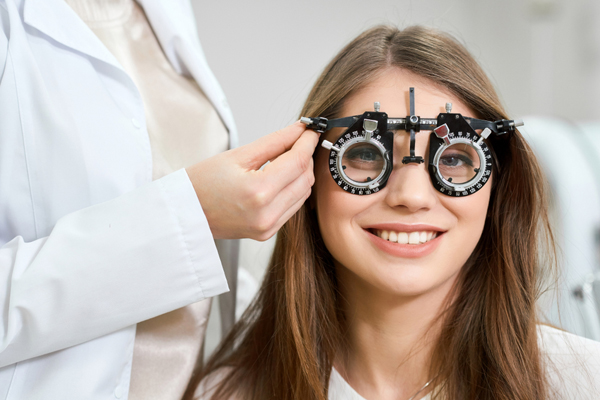Common Treatments for Myopia

Myopia, also known as nearsightedness, is a common condition that makes objects that are far away from you hard to make out. It is usually treated with either corrective lenses (in the form of eyeglasses or contacts) or laser-assisted surgery, both of which are designed to improve your overall vision.
Do you have difficulty driving because it is hard to read street signs? Are you able to read or use a computer without any issues but have difficulty reading objects like billboards or menus that are far away? You may have myopia.
What is myopia?
Myopia is a condition of the eye that makes things that far away look blurry, but objects that are closer look clear. People with myopia have longer eyeballs than normal, which prevents the lens of the eye from stretching and thinning. They may also have a lens that is fixed for near vision or a steeply curved cornea. This results in blurriness for things that are far away because light bends incorrectly, causing the image that reaches your eye to focus in front of the retina instead of on it. Myopia commonly appears in childhood and worsens into early adulthood. It is a very common condition, with one in four Americans having the ailment.
Myopia can be caused by genetics but also seems to appear at a more frequent rate for people who spend most of their time looking at things close up, such as books or computer screens. However, even if both parents have myopia, this does not necessarily mean the child will inherit it. In addition, even if neither parent has myopia, the child may still develop the condition.
Many people with myopia squint to see far away objects. Squinting helps correct the image by reducing the amount of light that reaches your eye.
There are some conditions associated with myopia. These include glaucoma, eye floaters, and retinal detachment. Seek emergency care if you show symptoms of retinal detachment, which include a curtain-like shadow in your field of vision, flashes of light, or the sudden experience of specks that seem to float in front of you.
For some people, myopia may become worse at night. This is called night myopia, though many people simply refer to it as their night vision.
Myopia is commonly diagnosed through an eye exam. Individuals with myopia will have difficulty reading the Snellen chart but can read the near-point card. Myopia can also be diagnosed through a slit lamp or retinal examination or an eye pressure test.
What are some common treatments for myopia?
Myopia can be corrected with eyeglasses or contacts, or refractive surgery using a laser. Concave lenses that refocus light into the retina are commonly used. If you wear contacts for your myopia, make sure you maintain them. Failure to do so may result in corneal infections or ulcers.
There is some evidence that suggests that distance correction when performing tasks that require close-up vision may reduce the severity of myopia. Spending more time outside where more objects are far away may also help.
While glasses and contacts have been the most common treatments in the past, laser surgery can be used to correct myopia and is becoming increasingly popular and routine. This treatment uses a focused laser beam to alter the form of the cornea. The two most common types of laser-assisted surgery are laser-assisted in situ keratomileusis (LASIK) and laser-assisted subepithelial keratectomy (LASEK).
With LASIK, the surgeon makes an incision and removes layers of the cornea to flatten it. With LASEK, the surgeon makes a smaller incision and reshapes and flattens the cornea with a laser. In both instances, you should not feel any discomfort during the procedure and the recovery time should be fairly short, though you may still need to wear glasses for a little while.
In a third type of surgery, photorefractive keratectomy (PRK), the surgeon completely removes the outer layer of the cornea and then continues as he or she would in a LASEK procedure. This protective layer, known as the epithelium, grows back on its own.
Conclusion
Myopia is a common condition that can be treated or managed effectively with eyeglasses, contacts, or surgery. Without treatment, it can progress to levels that impact your ability to perform everyday tasks, so it is important to have your vision examined.
If you are having difficulty seeing objects at certain distances, contact our office today for a consultation and eye exam. We will help you explore which options are available to you.
Check out what others are saying about our services on Yelp: Myopia in Mt Vernon, NY.
Recent Posts
Emergency eye care is needed if you find yourself dealing with a problem with your eye that causes pain or affects your vision. Failing to treat eye injuries as soon as they are detected can lead to permanent consequences, like reduced vision or blindness. Common eye injuries that require emergency eye care include: Exposure to…
Looking for more information on eye protection? An ophthalmologist knows everything there is to know about protecting the eyes. While there are a few different types of eye care professionals, ophthalmologists are eye care professionals who have undergone additional years of education and training so they can offer their patients both medical and surgical eye…
Controlling myopia at an early age can slow down its progression. This can help prevent yearly upgrades for stronger glasses. Your optometrist can help by offering various treatments. If you want to find out how your optometrist can help control myopia, here are the details.Optometrists use atropine eye drops to achieve short-term myopia control results.…
Another word for an itchy eye is ocular pruritis. It is a common health situation in many people. Itchiness in your eyes is more than enough reason to see an optometrist. Receiving prompt treatment is important in receiving prompt relief. If you want to know what causes an itchy eye and the treatments for it,…



